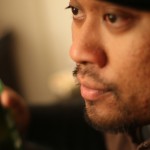Jason Bayani
 Jason Bayani is a recent Austin, TX transplant, by way of the Bay Area. A graduate of Saint Mary’s MFA program in Creative Writing, he is a Kundiman fellow and a highly regarded veteran of the National Poetry Slam scene. His work has been published in Fourteen Hills, Muzzle Magazine, the National Poetry Slam Anthology, Rattapallax, and Write Bloody’s classroom anthology, Learn Then Burn. He has been on 7 National Poetry Slam teams, he is a National Poetry Slam finalist, and was the 2010 International World Poetry Slam representative for Oakland, California. He has worked as a counselor and mentor for at-risk youth and taught at Saint Mary’s College.
Jason Bayani is a recent Austin, TX transplant, by way of the Bay Area. A graduate of Saint Mary’s MFA program in Creative Writing, he is a Kundiman fellow and a highly regarded veteran of the National Poetry Slam scene. His work has been published in Fourteen Hills, Muzzle Magazine, the National Poetry Slam Anthology, Rattapallax, and Write Bloody’s classroom anthology, Learn Then Burn. He has been on 7 National Poetry Slam teams, he is a National Poetry Slam finalist, and was the 2010 International World Poetry Slam representative for Oakland, California. He has worked as a counselor and mentor for at-risk youth and taught at Saint Mary’s College.
Ride
Every day during lunch break
Chuy Moreno would roll his ’67 Chevy Impala
round the front of John F. Kennedy High School,
his chassis waving like a Palm Sunday frond.
He was 16, cheekbones raw with acne,
had a mean mug more metal
than his box grill. He was a carpenter
who was a carpenter’s son. And learned enough
to know where to sign the contract, and where
commas and decimals belong in his paycheck.
Sometimes after cruising the roundabout
a few times, he would open his side door
and let a couple of the freshmen ride in the backseat
while he hit the hydraulics. We’d sit, cross armed
bending our mouths against our bottom lips, our mouths
that ached to say, again, again, again, again…
Playgrounds and Other Things
Finally let me say that I think my poem…is not “racist” but “racially complex.”— Tony Hoagland
The “privileged” white male has taken enough of a beating, don’t you think?— anonymous Internet commenter
I’m a runaway slave-master— Iggy Azalea
I.
Eighteen, and every day the city expands
inside of my lungs. I live this in full
heaving breaths, like I finally made it
to a clearing where the white kids couldn’t catch me
anymore… and we boys, bold and buried in invincible
swagger slapped on with so much bad cologne–
that day in the city, bass piping out of
our spindly forearms, we erupted into downtown
like we could dap the streets for all its shine;
and the old lady sculpted into the corner
of Sutter and Stockton–leaning into the wind–
I heard her tell it like broken glass,
“Go back to your country”. Couldn’t get angry enough
to breathe right; trying to remember if there was a word
for what makes you suddenly clutch your chest.
II.
Now imagine being told that she was only trying
to understand her racism (it’s complex, you know). Art
is what happens to her. You need to let it frame in the air.
There is art to recognition, the art is in the naming,
art is a mirror, you can make art out of this. You must
say it, before you can name it. There is no art
in being safe. You must risk uncomfortable truth.
The experience is not yours alone. This experience
is not owned by you. It is art, brave and honest art.
And how many more stories of trauma do we need to hear
from its least willing participants? Art rejects
the familiar. We’ve heard this story already. Stop
telling us this story already. The story is the old woman
glaring through her oversized sunglasses
at three brown boys who would presume to be this comfortable.
III.
Imagine being asked to applaud
and feeling guilty that it takes
you so long to remember you have hands.
IV.
I’m willing to say that we share
this particular sandbox equally.
You just have to let me kick sand in your face
for at least thirty years.
V.
There is nothing brave in showing this face.
I, too, find it real easy to talk
about how much I hate white people. It’s a pastime.
I eat that shit with my morning cereal. Most difficult
is the velocity of how I love you; things you can’t
turn off. There, dawg, is all the complex
racism any one of us can handle.
Note to poem: In 2011, at the annual AWP (Associated Writing Programs) Conference, Claudia Rankine read an open letter to Tony Hoagland, challenging him on his handling of race in his poetry. This was followed by a response from Hoagland, which prompted heated discussions around the topics of race and agency in art.